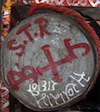Mumbai markings enhance service design
“The Dabbawalla service entails collection of freshly prepared meals from the residences of suburban office workers from vast reaches of the city, delivery to their workplaces and the return of empty lunch boxes (dabba or tiffin) to its original home – all for a reasonable monthly fee. Delivering over 200,000 lunch boxes each day to workers who have diverse eating habits (often governed by religion) requires an accurate system – especially as each lunch box commonly passes through the hands of at least six men, in quick exchange, on its path from home to office and back again. Most tiffins are collected by bicycle, sorted into destination groups, then carried together on trains and cycled to the offices of their respective customers. In between they are commonly carried on hand pushed carts and large head-balanced trays – all while jostling with chaotic Mumbai rail and road traffic.
With low literacy being an issue for some of the 5000 dabbawallas, they have devised a coding system using colour, symbols, numbers and a few letters which is painted on the lids of the tiffins to indicate the train lines, hub points and destinations at both ends of the delivery cycle. Each part of the marking can be understood by the relevant dabbawalla as the lunch box exchanges hands through the service chain. In the case that a lunch box gets on the wrong path, the code allows it to be set back on the right track – yielding only one mistake per 6 million deliveries according to economic analysis.”




